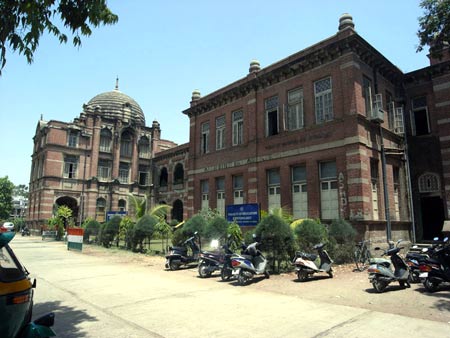Nobel laureate’s department struggles for students
 An alumnus from Vadodara’s Maharaja Sayajirao University may have given India its latest Nobel laureate, but the department of physics, where V. Ramakrishnan learnt the basics, is struggling to attract students.
An alumnus from Vadodara’s Maharaja Sayajirao University may have given India its latest Nobel laureate, but the department of physics, where V. Ramakrishnan learnt the basics, is struggling to attract students.
“While we are happy that our students has achieved a global honour, the declining interest for basic sciences among students is a cause for worry,” Professor AC Sharma, head, department of physics told Hindustan Times.
Six years back, Sharma said, the department attracted more than 400 applications for 52 seats in M. Sc Physics. Today, the number has dropped to 150.
On Wednesday, Ramakrishnan, 58, won the 2009 Nobel Prize for Chemistry with two other scientists. Before making a name as a researcher, Ramakrishnan graduated in physics from the faculty of science’s department of physics in 1971. He last visited the campus in January 2005 to deliver a lecture on deciphering biological macromolecular structures through biophysics.
Other departments such as Geography and Botany are finding it tough to fill the existing seats. Even for graduate courses, the qualification marks have been brought down from the earlier 60 per cent to 50 per cent.
“It is the basic sciences that offer greater potential to apply innovation. But for that we need good students, which we are not able to attract owing to the exodus towards engineering and other professional courses,” Sharma said.
Dr Surajit Mukherjee, a reader in the physics department, said the lack of motivation among students pursuing the subject was alarming.
“I do not think many of them have even thought of building a career in Physics.” Mukherjee, who did his research in Nuclear Physics, said Ramakrishnan had to move abroad in the 1970s since the conditions to pursue academics were not ideal. “The situation hasn’t improved much three decades hence,” he says.
While many teachers say the Nobel for Ramakrishnan would help rekindle an interest in the basic sciences, the government, on its part should make research opportunities in basic sciences more attractive, apart from enhancing employment opportunities.
“Besides liberal funding, an environment not constrained by red tape will go a long way in attracting students to the sciences,” Mukherjee said.